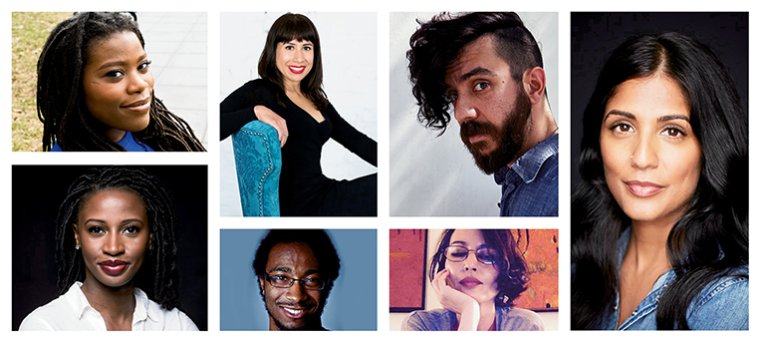Other faculty members duly note the strategic selection of young, notable literary figures. “The opportunity to get in on the ground floor of a singular new program, to be among this faculty, to help build something truly original with students who are as excited as I am—it’s a profound honor, a major occasion for gratitude,” says Akbar, who is also on the poetry faculty.

Clockwise from far upper left: faculty members Kaitlyn Greenidge, Erika L. Sánchez, Kaveh Akbar, Mira Jacob, Layli Long Soldier, Philip B. Williams, and Wayétu Moore. (Credit: Sánchez: Robyn Lindemann; Williams: Rachel Eliza Griffiths; Akbar: Marlon James; Jacob: In Kim)
“I’m so lucky to work with so many writers that I admire,” adds Sánchez, who will be teaching both fiction and poetry. “I expect that together we will foster a dynamic, compassionate, and rigorous writing community.”
For Kushner, who is teaching fiction and nonfiction, joining the Randolph College faculty is also a bit personal. “I grew up in a Hebrew-speaking home in a Yiddish-speaking town in New York,” she says. “I often write about the experience of living between languages and crossing borders of faith, language, and culture. Low-residency programs offer essential access to writers who might otherwise not be able to earn an MFA, and increasing access is a key element of increasing diversity.”
Dop understands that the culture and energy of a community has to take place organically, but he is also committed to guiding the tone of the program. He hopes to accomplish this through a series of talks, readings, and conversations about the complicated and troubling social and political climates that artists currently inhabit. “One of our panel discussions will be about the mental health of the artist,” he says. LuAnn Keener-Mikenas, a therapist and poet on staff at Randolph’s counseling center, will participate.
“A writing program should not only invest in teaching students how to write better, but it must also provide guidance for the artist’s life, including and especially the mental and emotional health of artists,” Dop says. “It is a hollow reward to have a student who becomes an award-winning writer but feels alone and unable to find emotional and relational health. We can’t expect that we’ll be the source of a student’s holistic health, but we can expect that we’ll regularly create conversations within our community about belonging and psychological health and the way in which our program can do better to provide a safe space for all our students.”
Dop doesn’t believe that creating a safe space means building a protective and insular bubble around the MFA community. On the contrary, it means coming to terms with one’s place in multiple environments, some of which are hostile. For such complexity of experience, Dop points out that the college’s location, in Lynchburg, might serve an asset. “Historically and presently, Virginia has been a space of conflict, embodying the worst and best of human choices,” he says. “Virginia knows democracy and genocide, slavery and freedom, racism and compassion, war and art. As we come together as writers, we won’t neglect what is still a very real part of life in the South. This is something our students can artfully engage with, if they so wish.”
Dop’s hope is that a diverse faculty will attract a diverse group of students and that a faculty of writers whose work is socially conscious will draw a particular type of student. “We want to welcome writers who are seeking to contribute meaningfully to our world,” Dop says. So far the applicant pool has yielded positive results, and the inaugural class of fourteen graduate students—among them poets, fiction writers, and nonfiction writers from throughout the United States—marks a promising beginning. Dop hopes the number of students will eventually grow to a robust community of forty-five to sixty writers across all three genres at each residency. “We can’t control all of the variables for who decides to attend Randolph,” Dop says. “But we can choose faculty who will signal the presence of a safe and productive environment for all writers—we want to be a community where all writers, including writers of color and LGBTQ writers, can thrive.”
Among the inaugural class is Jason Mendez, a nonfiction writer and interdisciplinary theater artist from the Bronx, New York. He was pleasantly surprised to find an MFA program with the kind of faculty he was looking for. “As a Puerto Rican writer, I need a community that I can fully trust with my work. I felt Randolph College’s faculty could resonate with my lived experiences and help me share my stories more creatively and effectively,” he says.
For Amelia Harrington, a Georgia native raised in Virginia who is also a musician and a graduate of Randolph College’s undergraduate program, the new MFA program is exciting. “I want to be a part of its becoming,” she says. “I want to know and love and support the other writers who were chosen for this adventuresome undertaking.” As for Joseph Capehart, a Liberian American poet living in Brooklyn, New York, his interactions with both the faculty and administration have thus far been encouraging. “Their commitment to us promises to extend beyond the two-year program and into our futures as professionals and people,” he says.
Apart from the obvious desire to mentor students who will go on to publish regularly and receive critical acclaim, Dop hopes this program will be known for nurturing literary citizenship. “I hope our faculty and students think of our program as belonging to them,” he says, “as one of the central communities of their lives.”
Only time will tell whether the new program at Randolph College will live up to its creators’ hopes. If it succeeds it has the potential to offer a concrete solution to the perennial problem posed at institutions and academic conferences about achieving and sustaining diversity in the MFA classroom. What’s more, it could become a model for other programs—one that creates and sustains a community of writers that is truly representative of the myriad identities and voices of the United States.
With the program’s inaugural year just under way, Dop is eager to assess the challenges and opportunities that present themselves and believes he can best serve the program by being its custodian.
“I like that word,” he says. “It implies guardian, curator, caretaker of a vision to empower these talented, amazing writers to teach and write. I’ve learned enough now to know that belonging begins within and eventually grows to become a gift we give each other. I belong to this new community in as much as I care for myself and our students and faculty. What a joy this will be.”
Part of that ongoing joy will be in selecting visiting writers to accompany the regular faculty during each residency (students attend five ten-day residencies, each held on the Lynchburg campus in the summer and winter throughout the two-year program, in addition to one-on-one faculty mentorship). Guest writers for upcoming residencies include advisory board members Stephanie Burt and Gregory Pardlo, as well as poet Tiana Clark, novelist and essayist Alexander Chee, novelist Nicole Dennis-Benn, and poet and essayist Hanif Abdurraqib.
“It’s a thrilling time,” Dop says. “There’s a line at the end of Kaveh’s book that closes the last poem, and I’ve held on to it as it relates to our new program: ‘The boat [we are] building / will never be done.’ We’re just getting started!”
Rigoberto González is a contributing editor of Poets & Writers Magazine.








